The UN Charter's preamble, which begins with "We the peoples," has been criticized as misleading. As political scientist Dov Ronen points out, "The UN was established by governments to serve the interests of states, not of 'peoples'." Despite its charter proclaiming the "sovereign equality of all its Members," the United Nations has long been a stage where powerful nations pull the strings and exert influence and power on the rest of the world.
The charter also originally outlined four main purposes: maintaining international peace and security, developing friendly relations among nations, achieving international cooperation, and harmonizing the actions of nations. The reality is that the organization has become involved in activities which have little or no relationship to its ostensible purpose.
One of the most striking examples of this expansion is the UN's foray into global economic management. The creation of bodies like the United Nations Development Programme (UNDP) and the United Nations Conference on Trade and Development (UNCTAD) signaled a shift towards a more interventionist approach in global economics. This expansion represents a dangerous trend toward international socialism and erosion of national sovereignty.
But who truly benefits from this so-called ‘global economic management’? Is it the impoverished communities the UN claims to uplift, or the elite circles tightening their grip on international affairs? The UN’s expansion into global economics isn’t just a shift—it’s a bold overreach into the sovereignty of nations, cloaked under the guise of collective progress.
The environmental arena provides another clear illustration of the UN's expanding reach. From the 1972 Stockholm Conference on the Human Environment to the recent push for global climate action, the UN has positioned itself as the primary arbiter of environmental policy.
We must ask ourselves: Does centralized control over environmental policies genuinely serve the planet’s best interests, or does it concentrate power in the hands of a few? When did we agree to surrender our local environmental decisions to an international body that may not understand the unique intricacies of our ecosystems?
The disconnect between rhetoric and reality has persisted throughout the UN's history, manifesting itself in initiatives like the Sustainable Development Goals (SDGs), which claim to serve global interests but often reflect the priorities of powerful member states.
The UN's approach to development, as embodied in the SDGs, reflects a particular ideological stance. The emphasis on global targets and centralized planning that aligns more closely with collectivist approaches to development. This ideology extends to the UN's educational and cultural programs like UNESCO which has been in the forefront of the drive to promote World Government through “re-education”.
History is riddled with examples of overambitious plans leading to unintended consequences. From empires stretching themselves thin to ideological movements imposing uniformity, the quest for centralized control has often come at the expense of individual freedoms and local autonomy.
This is a passage from the1946 founding document of UNESCO written by Sir Julian Huxley that plainly states the agenda of this organization:
“Thus even though it is quite true that any RADICAL EUGENIC POLICY will be for many years politically and psychologically impossible, it will be important for Unesco to see that the eugenic problem is examined with the greatest care, and that the public mind is informed of the issues at stake so that much that now is UNTHINKABLE may at least become THINKABLE.”
The “unthinkable” has manifested itself to the “thinkable” recently when in 2015, the United Nations unveiled its ambitious 2030 Agenda for Sustainable Development, featuring 17 Sustainable Development Goals (SDGs) designed to address “global challenges”. While these goals paint an alluring picture of a utopian future, a closer examination reveals a web of contradictions, unintended consequences, and potential pitfalls that threaten to undermine their lofty ambitions. Moreover, the UN's history of scandals and corruption casts a long shadow over the credibility of this grand initiative.
The United Nations just completed it’s “Summit of the Future,” a meeting aimed at ratifying what they call the “Pact for the Future”, a document intended to mobilize and accelerate the “Sustainable Development Goals” laid out in Agenda 2030, a long-term plan to radically reshape the world.
The recently released zero draft of the Pact for the Future outlines ambitious plans to overhaul the international financial architecture. While these proposals are presented as “transformative” steps toward achieving the Sustainable Development Goals (SDGs) and the objectives of Agenda 2030, a closer examination reveals serious shortcomings and areas of grave concern.
The word “transformation” is used frequently in these documents, which essentially lay out their plans, along with the usual buzzwords like “diversity,” “equity,” and my personal favorite, “inclusion.” Transformation is defined as a “thorough or dramatic change,” so when self-appointed global rulers start deliberately using it to describe the policies they have planned for us, it would be wise to take them seriously.
Of course, at the core of this is the fact that neither you nor I have had any voice in this process. I’m beginning to think that the words “democracy” and “inclusion” mean something entirely different to the elites. The overuse of these terms has transformed them into what are essentially fascistic dog whistles to my ears, perhaps even a modern form of Orwell’s Doublespeak.
Are these buzzwords mere linguistic smoke screens designed to placate the masses while obscuring the true intentions of policymakers? Perhaps ‘diversity’ and ‘inclusion’ are not ends in themselves but tools wielded to push an agenda that consolidates power rather than disperses it.
The Illusion of Consensus
The SDGs have been lauded for their inclusive development process, involving extensive consultations with various stakeholders. However, this apparent consensus masks fundamental disagreements about development priorities and strategies. As William Easterly, a prominent development economist, points out, "The SDGs are so encyclopedic that everything is top priority, which means nothing is a priority". This lack of focus dilutes efforts and resources, potentially hindering progress on all fronts.
The sheer number of goals and targets - 17 goals with 169 targets - creates a complex web of objectives that are often interconnected and sometimes contradictory. For instance, the goal of economic growth (SDG 8) can conflict with environmental sustainability goals (SDGs 13, 14, and 15). This complexity makes it challenging for countries to prioritize and allocate resources effectively, leading to a fragmented approach that may fail to address the root causes of development challenges.
If this so-called consensus is built on shaky foundations, then whose vision are we truly advancing? Is it a collective dream or a manufactured narrative imposed by those who stand to gain the most? By glossing over fundamental disagreements, are we not silencing critical voices that could offer valuable perspectives?
The Trust Deficit: UN Scandals and Corruption
The UN's ability to lead such an ambitious global agenda is severely undermined by its history of scandals and corruption. The Oil-for-Food scandal in Iraq, which came to light in 2004, revealed widespread corruption and mismanagement within the UN system. The program, intended to allow Iraq to sell oil in exchange for food and medicine, was marred by kickbacks and bribes, with an estimated $1.8 billion in illicit payments. This scandal not only tarnished the UN's reputation but also raised serious questions about its ability to manage large-scale international programs.
More recently, the UN has faced criticism for its handling of sexual abuse allegations against peacekeepers. In 2016, it was revealed that UN peacekeepers in the Central African Republic had sexually abused dozens of women and children. The UN's slow response and perceived lack of accountability further eroded trust in the organization.
These scandals directly impact the credibility of the SDGs, particularly Goal 16, which aims to promote peace, justice, and strong institutions. How can the UN effectively champion anti-corruption efforts when its own house is not in order?
Quantification Without Qualification
The SDGs' reliance on quantitative targets often overlooks the qualitative aspects of development. For instance, SDG 4 aims to "ensure inclusive and equitable quality education," yet the metrics focus primarily on enrollment rates rather than learning outcomes. A study by the World Bank found that in many low and middle-income countries, more than half of children cannot read and understand a simple story by the end of primary school, despite increased enrollment.
This emphasis on quantitative metrics can lead to perverse incentives. Countries may focus on improving the numbers without addressing the underlying quality issues. For example, to meet enrollment targets, schools might lower standards or promote students regardless of their actual learning progress. This approach risks creating a generation of students who are technically "educated" but lack the skills necessary for meaningful participation in the workforce or society.
The Climate Conundrum
Perhaps the most contentious of the SDGs is Goal 13, which calls for "urgent action to combat climate change and its impacts." Critics argue that the scientific consensus on anthropogenic climate change is less robust than commonly portrayed, and that the proposed solutions could have severe economic consequences, particularly for developing nations.
Bjorn Lomborg, president of the Copenhagen Consensus Center, contends that "the current approach to climate change is failing" and that the focus on emissions reduction diverts resources from more pressing development needs. Lomborg argues that the trillions of dollars required for a rapid transition to renewable energy could be more effectively spent on immediate poverty alleviation, healthcare, and education in developing countries.
Moreover, the push for renewable energy to combat climate change has led to unintended consequences. The increased demand for minerals like cobalt and lithium, essential for batteries and solar panels, has resulted in environmental degradation and human rights abuses in mining regions. A report by Amnesty International highlighted severe human rights violations in cobalt mining in the Democratic Republic of Congo, directly linked to the global clean energy supply chain.
Climate Finance: A Trojan Horse for Corporate Profit and Government Control
The Summit of the Future aims to reform the financial architecture to meet the purported challenge of climate change and scale up investment in sustainable infrastructure, ostensibly in line with the Paris Agreement and SDG 13.
The push for climate finance reform is less about environmental protection and more about creating new avenues for corporate profit and government control. The proposed changes to the financial architecture under the guise of addressing climate change raise several red flags:
1. Profit-Driven Agenda: Many of the largest proponents of climate finance are multinational corporations and financial institutions that stand to benefit enormously from government-subsidized "green" initiatives. This conflict of interest casts doubt on the true motivations behind these reforms.
2. Government Overreach: The call for massive investment in sustainable infrastructure provides a pretext for increased government intervention in markets and personal freedoms. This could lead to more regulations, higher taxes, and restrictions on individual choices, all justified by the nebulous goal of "fighting climate change".
3. Misallocation of Resources: Funneling vast sums of money into climate initiatives diverts resources from more pressing issues like poverty, disease, and basic infrastructure needs in developing countries. This misallocation of funds may actually harm the most vulnerable populations these policies claim to protect.
4. Lack of Accountability: The complex nature of climate finance makes it ripe for corruption and misuse of funds. There's a troubling lack of transparency in how climate funds are allocated and used, with little evidence of their effectiveness.
5. Scientific Uncertainty: The urgency attributed to climate change often overlooks the ongoing scientific debates about the extent and causes of global warming. Basing sweeping financial reforms on contested science is irresponsible and potentially harmful to global economic stability.
6. Technological Lock-in: By heavily investing in current "green" technologies, we risk locking ourselves into potentially inefficient or harmful solutions, stifling innovation and adaptability in the face of future challenges.
In essence, the proposed climate finance reforms may serve more as a mechanism for wealth redistribution to well-connected corporations and expansion of government power, rather than as a genuine solution to environmental concerns. The lack of transparency, potential for corruption, and disregard for market forces in these proposals should be cause for serious skepticism.
The Financing Gap and Corruption Risks
The UN estimates that achieving the SDGs will require annual investments of $5-7 trillion. This astronomical figure raises serious questions about the feasibility of the goals, especially in the wake of global economic shocks like the COVID-19 pandemic. The pandemic alone has pushed an estimated 97 million additional people into extreme poverty in 2020, according to the World Bank, potentially wiping out years of progress.
Moreover, the emphasis on public-private partnerships and "blended finance" to bridge this gap has been criticized for potentially prioritizing profit over development outcomes. A report by Eurodad found that such financing mechanisms often fail to reach the poorest and most vulnerable populations. There's a risk that private sector involvement could lead to the commodification of essential services, potentially exacerbating inequalities rather than reducing them.
The massive influx of funds required for the SDGs also presents significant corruption risks. The UN's own record in managing large-scale programs, as evidenced by the Oil-for-Food scandal, raises concerns about its ability to ensure that these funds are used effectively and transparently. Developing countries, which are often plagued by weak institutions and endemic corruption, may struggle to absorb and utilize these funds without significant leakage.
The focus on increasing the quantity of available finance overlooks critical issues of quality and effectiveness. The push to mobilize both public and private investment in the Sustainable Development Goals (SDGs) may prioritize the volume of funds over their impact, potentially leading to misallocated resources and ineffective interventions. Moreover, increasing the lending capacity of multilateral development banks without addressing fundamental issues in the global economic structure risks exacerbating debt problems in developing countries
Institutional Governance: Reshuffling the Same Deck
Updating IMF quota formulas and reforming voting rights to better reflect the changing global economic landscape and give developing countries more voice.
While ostensibly aimed at democratizing decision-making, these reforms may merely reshuffle existing power dynamics without addressing fundamental imbalances. The proposed changes to quota formulas and voting rights are likely to result in marginal adjustments that fail to significantly alter the institution's core power structure. Moreover, the persistence of the "gentlemen's agreement" that allows Europeans to appoint the IMF Managing Director and Americans to choose the World Bank President underscores the superficial nature of these reforms.
The Accountability Vacuum
Perhaps the most fundamental criticism of the SDGs is their lack of enforceability. As non-binding agreements, they rely entirely on voluntary action by nations and organizations. This absence of accountability mechanisms raises serious doubts about their effectiveness. The voluntary nature of the SDGs means that countries can cherry-pick which goals to focus on, potentially neglecting more challenging or politically sensitive issues.
The Global Digital Compact: Worldwide Skynet
As part of the United Nations' recently adopted "Pact for the Future," the Global Digital Compact (GDC) has been hailed as a groundbreaking framework for digital cooperation and AI governance. However, a closer examination reveals a concerning agenda that could have far-reaching implications for individual privacy, freedom, and national sovereignty.
Understanding the Global Digital Compact
The GDC, annexed to the Pact for the Future, outlines several key objectives:
1. Connecting all people, schools, and hospitals to the internet
2. Making data more open and accessible
3. Anchoring digital cooperation in human rights and international law
4. Making the online space safe for all, especially children
5. Governing Artificial Intelligence
6. Establishing global data governance standards
While these goals may sound benevolent on the surface, they raise significant concerns about the potential for increased surveillance, control, and erosion of individual freedoms.
Digital ID: The Gateway to Universal Surveillance
One of the most alarming aspects of the GDC is its implicit support for digital identity systems. Under the guise of "connecting all people," the compact paves the way for the implementation of universal digital IDs. As NSA whistleblower and privacy advocate Edward Snowden has warned, "A world of universal digital identification is a world without privacy". Such systems could enable unprecedented levels of government surveillance and control over citizens' daily lives.
The push for "open and accessible data" further compounds these concerns. While presented as a means to foster innovation and transparency, this initiative could lead to the erosion of personal data protection. As cybersecurity expert Bruce Schneier notes, "Data is the pollution problem of the information age". The more data that becomes "open and accessible," the greater the risk of misuse and privacy violations.
Digital Currency: A Tool for Financial Control
The GDC's emphasis on digital cooperation and governance also sets the stage for the implementation of central bank digital currencies (CBDCs). While not explicitly mentioned in the compact, the push for digital financial inclusion aligns closely with the goals of many CBDC initiatives.
Critics argue that CBDCs could give governments and central banks unprecedented control over individuals' financial lives. As economist John Cochrane warns, "A central bank digital currency would give the government the power to decide who gets to spend money and on what". This level of control could be used to implement social credit systems or enforce political compliance through financial means. Virtually every major central bank in the world including the Federal Reserve are running pilots programs and publishing research on their finding to better understand CBDC implementation. The Atlantic Council has even created a “Central Bank Digital Currency Tracker”. As of today there are 134 countries exploring CBDC’s, 66 of which are in advanced phases of development and what the Atlantic Councils calls “currency unions”.
AI Governance: Censorship on Steroids
The GDC's commitment to "govern Artificial Intelligence" is particularly concerning given the potential for AI to be used as a tool for mass surveillance and censorship. The proposed "International Scientific Panel" and "Global Policy Dialogue on AI" could easily become mechanisms for imposing global standards that prioritize control over innovation and free speech.
As AI researcher Gary Marcus cautions, "The rush to implement AI governance without fully understanding the technology's implications could lead to unintended consequences that stifle innovation and free expression". Another way to look at it is that the technology is well understood already and this is precisely the reason why such efforts are being put into place in order to establish a “governance framework” i.e. seize control and therefore power.
Creating a Permanent Digital Safe Space
The compact's emphasis on making the online space "safe for all" is a classic example of sacrificing liberty for the illusion of security. History has shown that such initiatives often lead to increased censorship and surveillance.
In the digital realm, the concept of "safety" can be particularly problematic. It can be used to justify:
1. Mass surveillance: Governments may argue that monitoring all online communications is necessary to identify and prevent threats.
2. Content censorship: Under the guise of protecting users from harmful content, authorities may implement broad censorship measures that stifle free expression.
3. Mandatory identification: Requirements for real-name registration or digital IDs can be justified as necessary for online safety, but they erode privacy and anonymity.
4. Encryption backdoors: Governments often push for weakened encryption or backdoors, claiming they are necessary for law enforcement and counter-terrorism efforts.
The danger lies in the subjective nature of "safety" and the potential for mission creep. What starts as a measure to protect children or prevent terrorism can easily expand to suppress political dissent or marginalize certain groups. The emphasis on safety often overlooks the importance of risk and freedom in a healthy society.
The compact's vague language and broad scope provide ample opportunity for the implementation of invasive digital ID systems, centralized digital currencies, and AI-powered surveillance tools.
Conclusion
In conclusion, while the SDGs represent at first glance, a noble attempt to address global challenges, they are fraught with contradictions and potential pitfalls. Their broad scope, reliance on questionable metrics, and lack of enforceability mechanisms raise serious doubts about their ability to achieve meaningful progress. The UN's history of scandals and corruption further undermines the credibility of this ambitious agenda.
As we approach the midpoint of the 2030 Agenda, it's crucial to critically reassess these goals and consider more focused, realistic approaches to global development. The SDGs' ambitious vision for a better world is commendable, but without addressing these fundamental issues and rebuilding trust in the institutions tasked with implementing them, they risk becoming another set of unfulfilled promises in the long history of international development efforts.
A more nuanced, context-specific approach that prioritizes local needs and capacities, coupled with stronger accountability mechanisms and a renewed commitment to transparency and anti-corruption efforts, may be necessary to achieve genuine, sustainable progress in global development. Without these changes, the SDGs may indeed prove to be a mirage of progress, offering false hope while failing to deliver on their transformative potential but then again, that may just be the point.
A grand spectacle of ambition designed to distract us from an underlying agenda. Are we witnessing a sincere effort to tackle global challenges, or is this a calculated move to centralize control and reshape the world according to the visions of a select few?
It’s time we peel back the layers of rhetoric and confront the uncomfortable truths beneath.
References:
Ronen, D. (1979). The Quest for Self-Determination. Yale University Press. https://yalebooks.yale.edu/book/9780300023640/the-quest-for-self-determination/
United Nations. (1945). Charter of the United Nations. https://www.un.org/en/about-us/un-charter
Weiss, T. G., & Daws, S. (Eds.). (2018). The Oxford Handbook on the United Nations. Oxford University Press. https://academic.oup.com/edited-volume/28182
Mazower, M. (2009). No Enchanted Palace: The End of Empire and the Ideological Origins of the United Nations. Princeton University Press. https://press.princeton.edu/books/paperback/9780691157955/no-enchanted-palace?srsltid=AfmBOoqjC4rWrPwxFrCjsRzZtBOmRJ74bbAhmqxqiryhYJB5hA0Tv_QN
Easterly, W. (2015). The SDGs Should Stand for Senseless, Dreamy, Garbled. Foreign Policy. https://foreignpolicy.com/2015/09/28/the-sdgs-are-utopian-and-worthless-mdgs-development-rise-of-the-rest/
Volcker, P. A., Goldstone, R. J., & Pieth, M. (2005). Independent Inquiry Committee into the United Nations Oil-for-Food Programme. https://press.un.org/en/2005/sc8492.doc.htm
Essa, A. (2016). UN peacekeepers accused of sexual abuse in CAR. Al Jazeera. https://www.aljazeera.com/amp/news/2016/4/5/un-peacekeepers-go-on-trial-for-car-sex-abuse
World Bank. (2019). Ending Learning Poverty: What Will It Take? https://documents1.worldbank.org/curated/en/395151571251399043/pdf/Ending-Learning-Poverty-What-Will-It-Take.pdf
Lomborg, B. (2020). False Alarm: How Climate Change Panic Costs Us Trillions, Hurts the Poor, and Fails to Fix the Planet. Basic Books. https://www.amazon.com/False-Alarm-Climate-Change-Trillions/dp/1541647467
Amnesty International. (2016). "This is what we die for": Human rights abuses in the Democratic Republic of the Congo power the global trade in cobalt. https://www.amnesty.org/en/documents/afr62/3183/2016/en/
United Nations. (2019). Roadmap for Financing the 2030 Agenda for Sustainable Development. https://www.un.org/sustainabledevelopment/wp-content/uploads/2019/07/EXEC.SUM_SG-Roadmap-Financing-SDGs-July-2019.pdf
World Bank. (2020). Poverty and Shared Prosperity 2020: Reversals of Fortune. https://www.worldbank.org/en/publication/poverty-and-shared-prosperity-2020
Eurodad. (2018). History RePPPeated: How Public-Private Partnerships are Failing. https://www.eurodad.org/historyrepppeated
Stamping out corruption can give SDGs $3 trillion boost https://www.un.org/en/desa/stamping-out-corruption-can-give-sdgs-3-trillion-boost
Bretton Woods Institutions at 80: What should the future look like? https://is.gd/4hz2kA
Better data on corruption can reduce its impact, support sustainable ... https://news.un.org/en/story/2023/08/1140282
Corruption Is Still the Number One Barrier to Sustainable Development https://ethixbase360.com/corruption-and-sustainable-development/
FACTSHEET: Corruption and the Sustainable Development Goals https://unis.unvienna.org/unis/en/pressrels/2023/uniscp1172.html
The sustainable development goals as a framework to combat health sector corruption https://www.ncbi.nlm.nih.gov/pmc/articles/PMC6154071/
There's a reason for the lack of trust in government and business https://www.imf.org/en/Blogs/Articles/2018/05/04/theres-a-reason-for-the-lack-of-trust-in-government-and-business-corruption
What Are the UN Sustainable Development Goals? https://www.cfr.org/backgrounder/what-are-un-sustainable-development-goals
The Sustainable Development Goals Report https://unstats.un.org/sdgs/report/2024/The-Sustainable-Development-Goals-Report-2024.pdf
Carney, M. (2021). "Value(s): Building a Better World for All". Signal. https://www.amazon.com/Value-Building-Better-World-All/dp/1541768701
Transparency International. (2011). "Global Corruption Report: Climate Change". https://www.transparency.org/en/publications/global-corruption-report-climate-change
Koonin, S. E. (2021). "Unsettled: What Climate Science Tells Us, What It Doesn't, and Why It Matters". BenBella Books. https://www.amazon.com/Unsettled-Climate-Science-Doesnt-Matters/dp/1950665798
Smil, V. (2022). "How the World Really Works: The Science Behind How We Got Here and Where We're Going".Viking
https://www.amazon.com/How-World-Really-Works-Science/dp/0593297067




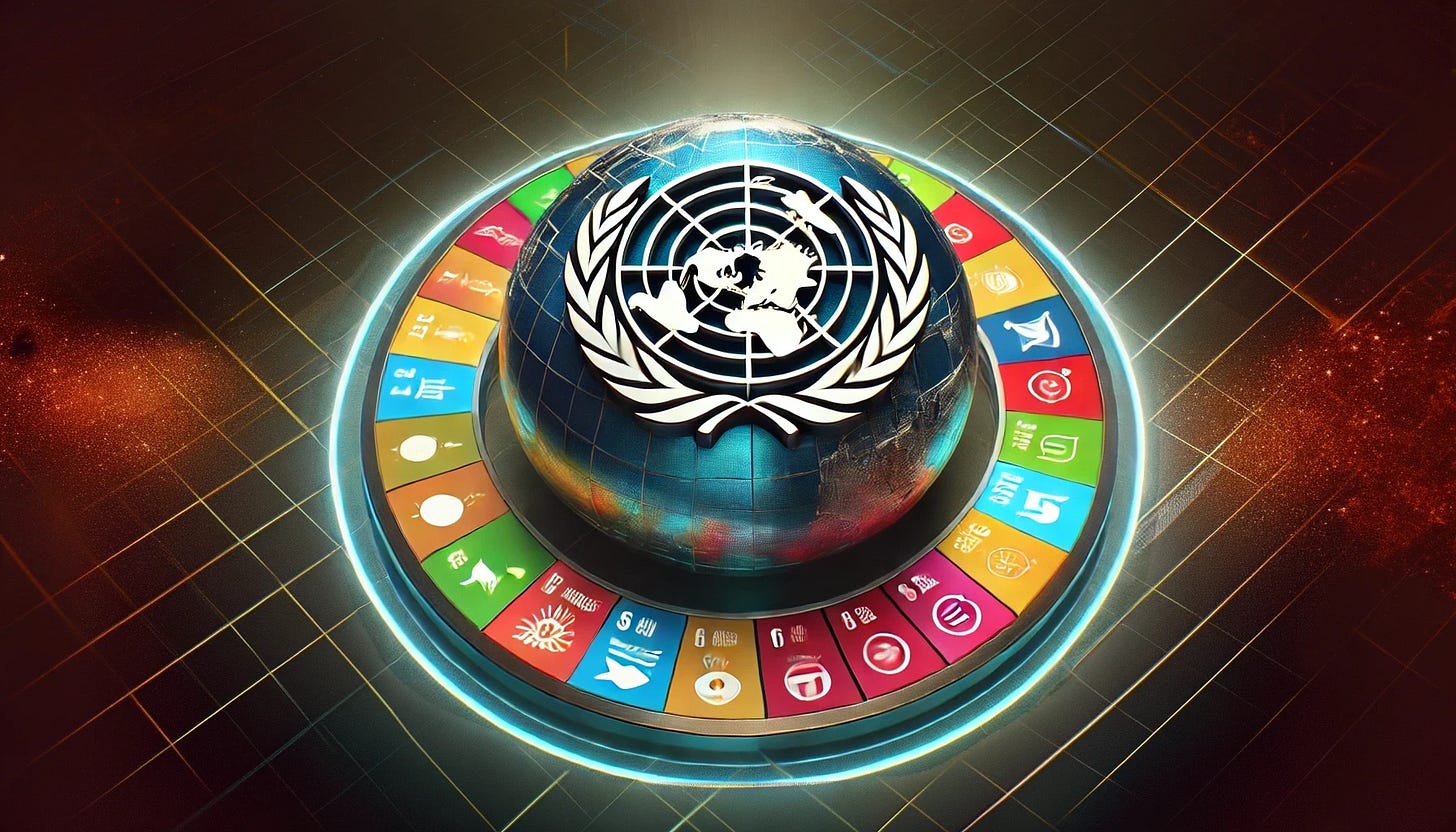

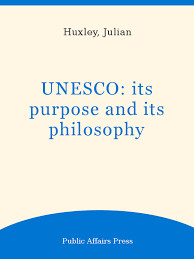




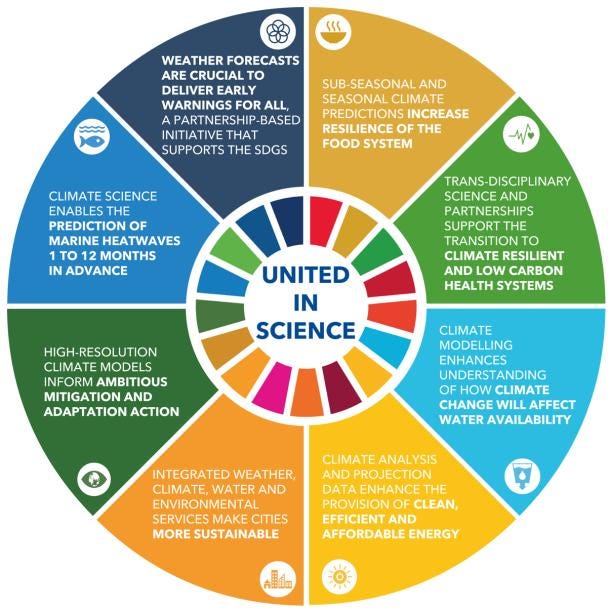
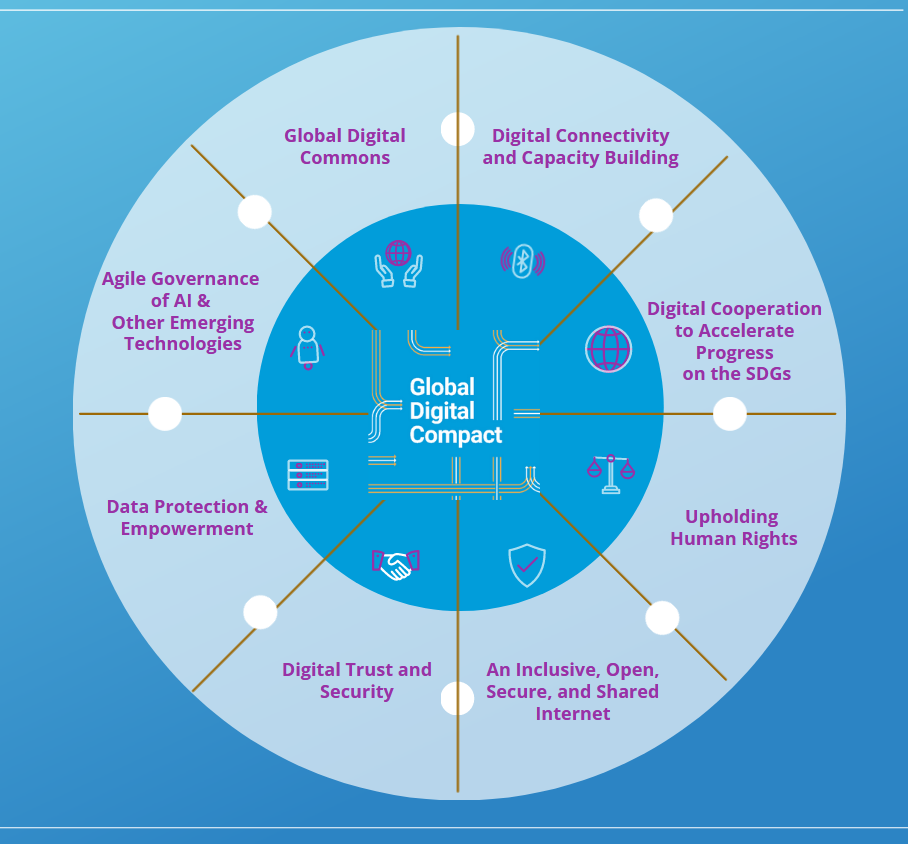
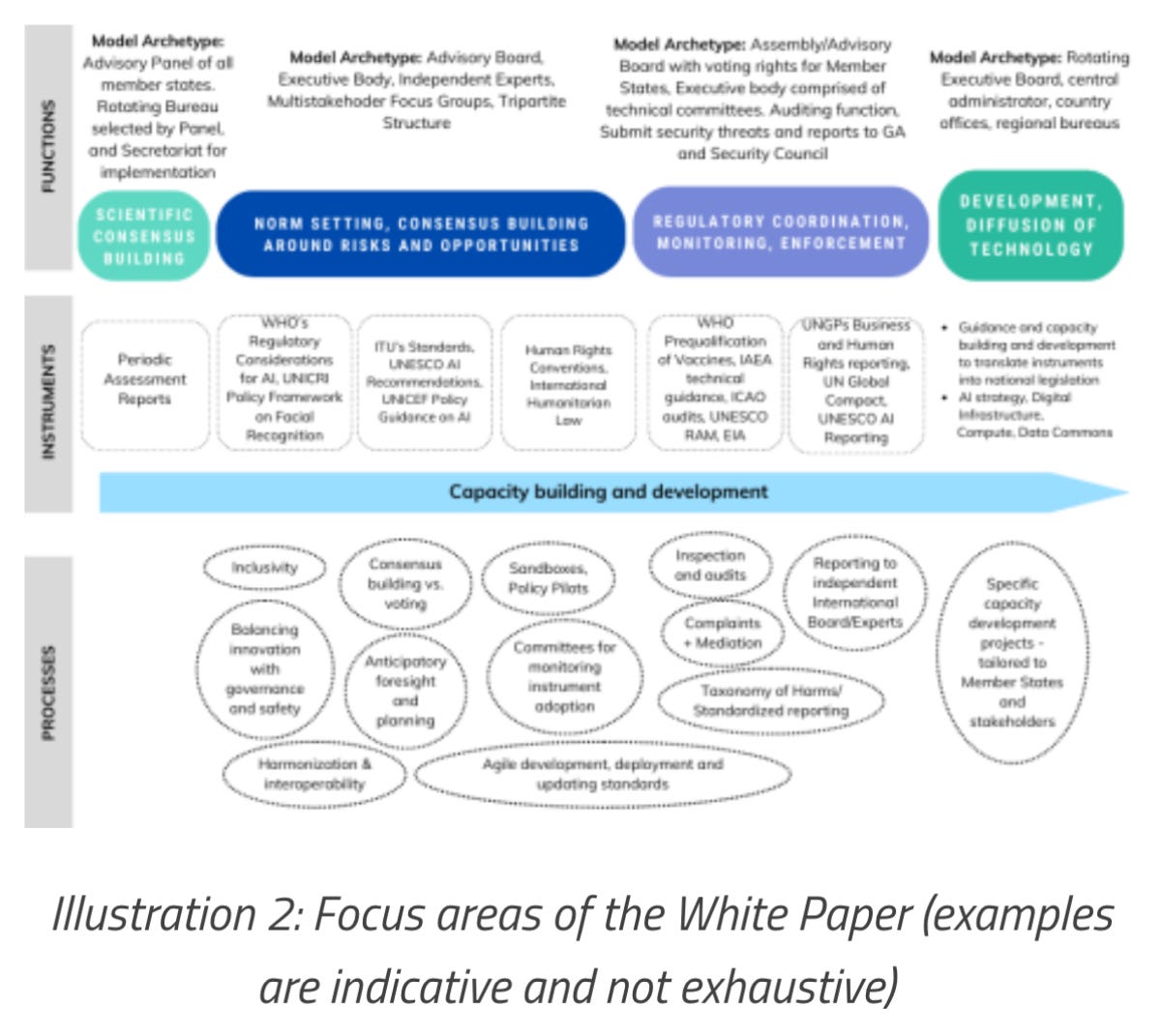
You nailed it. Nothing that the UN nor any of the other alphabet agencies push out is for the useless eaters benefit and has everything to do with money and achieving Agenda 2030. As the Plandemic evidenced, we are chattel to be eliminated, subjugated, and/or enslaved. Have you heard of Deagel Predictions ( https://www.thevoid.uk/void-post/deagel-2025-population-and-output-forecast-revisited-essential-guide/ )? Next year could be devastating for the world if the predictions turn out to be true.
The way I see it, the Cabal has come this far with their evil plans, they are starting to reveal the quiet parts which in and of itself is troubling, and I don’t see them throwing in the towel because of Trump…should we even have an election or it’s just outright stolen as was the last one. Whatever comes to pass, we are in for the most dangerous and trying times of our nation’s history and the world at-large.
This is a most excellent and comprehensive analysis exposé, Josh of the UN Utopian Wet-dream. All of their ambitions are unrealistic beyond rational and doomed to fail, as you rightly imply. Thank you Josh, that's a lot of hard work and detailed research.
But there is hope as the multipolar world emerges assuming we can avoid an all-out global conflict:
https://www.theburningplatform.com/2024/05/25/the-financial-jigsaw-part-2-global-north-v-global-south-energy-review-arrest-all-of-them-bankers-ponzi-scheme-schwab-steps-down-from-wef/
Cheers
AP
https://austrianpeter.substack.com/p/anarchy-britain-grooming-facial-id?sd=pf